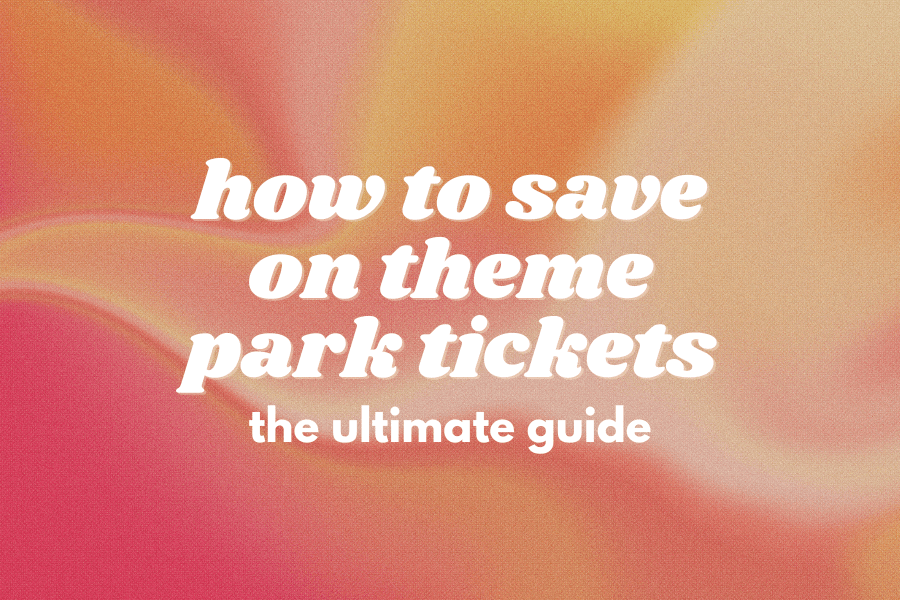Disclosure: This post may contain affiliate links, meaning I get a commission if you decide to make a purchase through my links, at no cost to you. Please read my disclosure for more information.
No matter what park you’re eyeing, theme park tickets keep hitting wallets harder than a mid-summer rollercoaster drop. From tiny local parks to mega-resorts like Disney, prices are soaring faster than a launched coaster—and everyday folks are feeling the sting.
That’s why planning ahead is everything if you want to save money on theme park tickets in 2025. Sure, this site’s all about scoring cheap churros and $5 pizza slices, but let’s face it: saving on tickets means more cash for snacks (priorities, right?).
This guide is your one-stop resource for budget-savvy parkgoers who want maximum fun without the financial hangover. I’ll share insider tips, timing tricks, and even a few affiliate links to deals you might’ve missed (don’t worry—they’re free for you, but help keep this blog running!).
P.S. You may see things repeat a couple times in different sections to drill home points in different ways in case you don’t want to read the entire blog post.
Let’s dive in.
Why Theme Park Tickets Are So Expensive in 2025
Short answer? The theme park industry is a mature market—which is economist-speak for “there’s no room for new kids on the block.” Established giants like Disney and Universal dominate the playground, leaving little room for startups to compete.
These big players have a VIP pass to combat inflation, demand spikes, and shiny new rides. They’ve got cash flow, loyal fans, and pricing power that newer parks (think: your regional “Adventure Zone”) can only dream of. But even the giants aren’t immune to rising costs. To offset inflation and fund new attractions (cough Disney’s Avengers Campus cough), parks hike ticket prices yearly—and yes, that $12 pretzel gets pricier too.
Take Disney’s dynamic pricing model: a random Tuesday in March costs less than Thanksgiving at Magic Kingdom. And when Disney sneezes, the whole industry catches a cold. Universal, Six Flags, and even smaller parks are adopting surge pricing like it’s Uber for rollercoasters.
So how do you fight back? Strategize like a pro. Plan around food festivals, off-peak seasons, and ticket-buying windows. (Spoiler: Annual passes typically save you money—more on that later.)
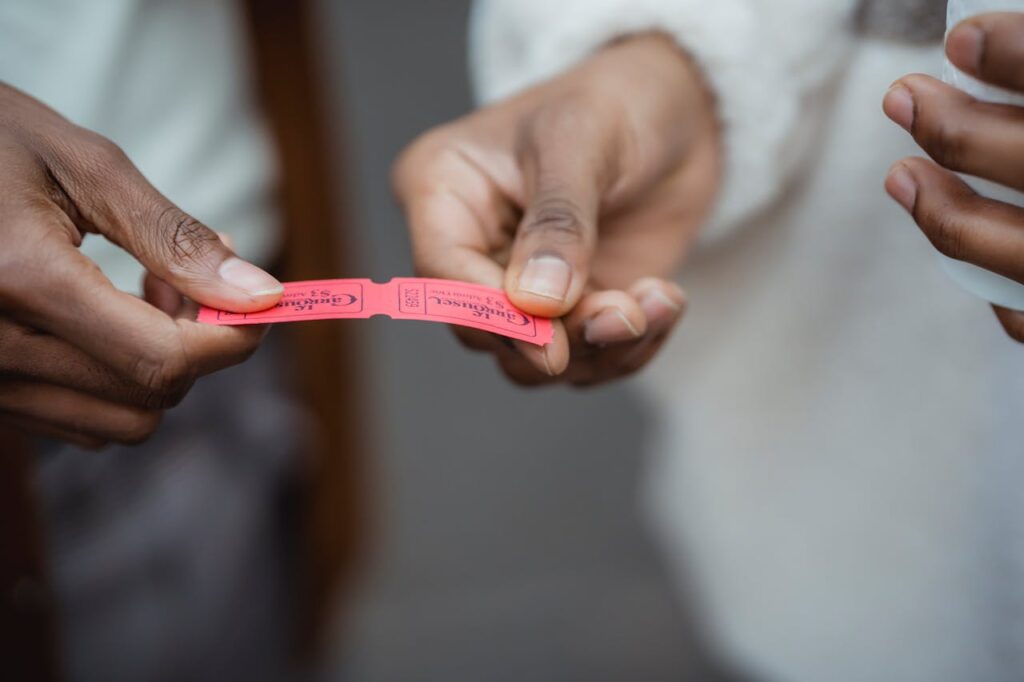
Start Planning Early: The Key to Big Savings
Planning a theme park trip is like prepping for a heist: you need blueprints, timing, and a getaway driver (or in this case, a sturdy stroller). The earlier you plan, the more you save—period.
Sure, you can wing it at smaller parks (looking at you, Lake Compounce), but for biggies like Disney or Universal? Start plotting 6-12 months out, especially if your trip falls into one of these categories:
- Once-in-a-lifetime splurges (Proposing in front of Cinderella’s Castle? Worth it!)
- Milestone celebrations (Junior’s first coaster ride > his future college graduation)
- Trips with grandparents or toddlers (Naps and mobility breaks aren’t optional)
- Tight budgets (Because “surprise” $200/day tickets ruin vacations).
Here’s your game plan:
- Lock in dates ASAP: Parks release their ticket calendar for the season (or for the full year like Disney). Snag them before prices climb.
- Stalk crowd calendars: Tools like Undercover Tourist’s or Touring Plan’s Crowd Calendar predict busy days so you can dodge them like a pro.
- Embrace “shoulder seasons”: Aim for January-February or September-November. Fewer crowds = cheaper tickets + a happier you.
- Multi-day passes = magic: The more days you buy, the less you pay per day. A 5-day Disney ticket can cost less per day than a 1-day pass!
- Set price alerts:
- Undercover Tourist tracks prices and sends deal alerts.
- MouseSavers emails free newsletters with limited-time promos (Disney, Universal, etc.).
- Google Flights hack: Use Google’s “Track prices” feature for flight deals, then cross-reference with park calendars to score cheap travel + ticket combos.
Pro tip: Theme park tickets rarely drop last-minute, but you can set up Google Alerts for a phrase like “Disney ticket sale 2025.” Just avoid shady third-party sellers—stick to authorized partners!
Best Time to Buy Theme Park Tickets in 2025
Believe it or not, timing your theme park ticket purchase is a lot like avoiding rush hour traffic.
Peak season is the bumper-to-bumper, horns-blaring, middle-finger-flipping chaos of the theme park world. Crowds swell, prices surge, and patience wears thin (even Mickey Mouse might side-eye you). It’s when families jostle for ride queues, chicken nuggets come out lukewarm, and everyone pays a premium for the stress.
Off-peak season, though? That’s the open highway. You’ll still hit a few potholes (a rainy Tuesday or a surprise school group), but lines shrink, cast members smile wider, and your wallet stays happier. Tickets are cheaper, rides feel smoother, and you can actually taste that $15 churro.
But here’s the catch: most theme parks don’t have fixed “off-peak” schedules. Like rush hour patterns shifting after a new highway opens, parks like Disney and Universal may tweak their calendars yearly. What worked in 2018 might leave you gridlocked in 2025.
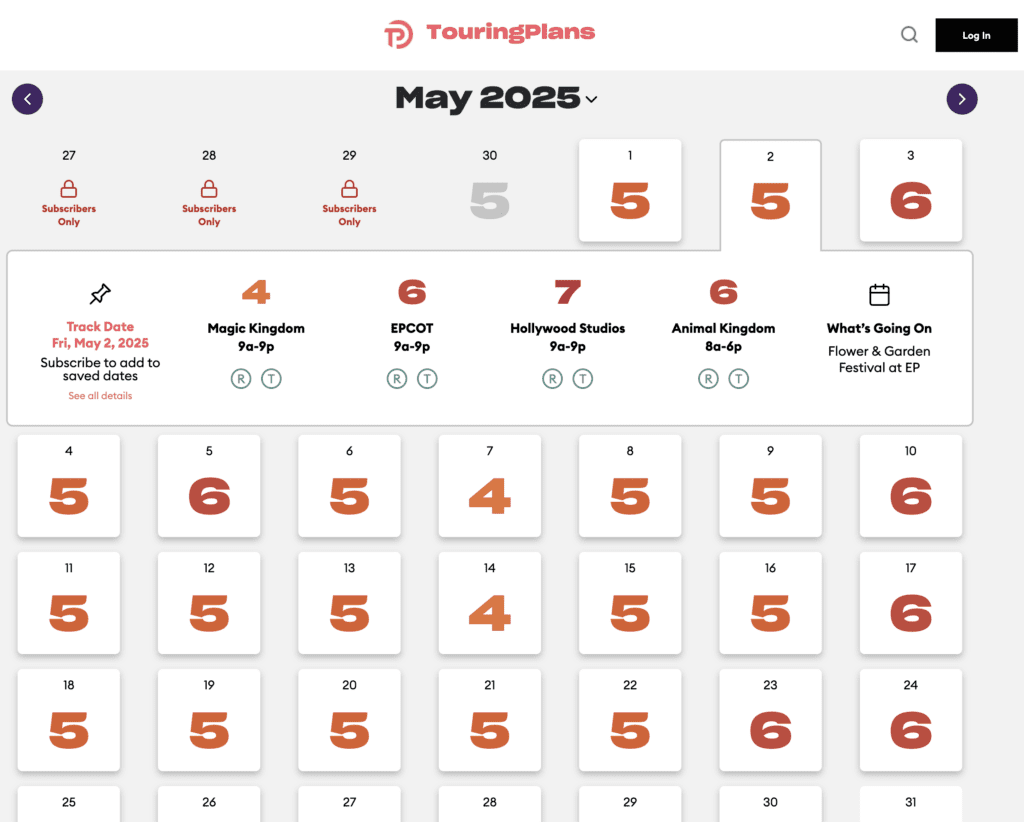
So how do you outsmart the system?
- Plan like you’re dodging traffic jams.
- Buy tickets 3–6 months early—prices rarely drop as your date nears.
- Aim for traditional “shoulder seasons”: January-February or September-November (avoid Halloween events!). These are your secret HOV lanes. However, check crowd calendars to see what has changed just in case.
- Use a “crowd calendar” like it’s Waze.
- Parks like Disney and Universal have crowd-predicting tools (e.g., Touring Plan’s calendar). For smaller parks? Avoid holidays/weekends—July 4th is the I-95 of theme park days.
- Snag sales like they’re exit ramps.
- End of the Season: Local and regional parks (e.g., Lake Compounce and Six Flags) will run sales at the end of the season with deep discounts on next year’s Annual/Season passes. They’re usually available for two to three weeks with the potential to return right before the season opens, but this is when those discounts are typically the best as parks are looking to get a headstart on their headcount for attendance in the new season.
- Black Friday/Cyber Monday: Deep discounts sometimes exist on sites like Groupon or even on the parks websites for annual passes.
- Dynamic pricing = surge pricing with Uber and Lyft. Depending on the season, day, demand, park, prices fluctuate. Buy early so you’re not paying more.
- Last-minute? Proceed with caution.
- Flash sales sometimes pop up, but it’s like trusting a detour sign in a construction zone. Risky!
Bottom line: Buy early, avoid holidays, and treat off-peak days like your GPS’s “avoid highways” hack. Your wallet (and sanity) will thank you! 🚗💨
Top Websites to Buy Discounted Theme Park Tickets
Finding discounted tickets from trusted sources is one of the best ways to save money on theme park admission. Here are some of the top websites where you can buy legitimate, discounted tickets:
- Undercover Tourist : One of the most reputable third-party resellers, offering discounted tickets for Disney, Universal, SeaWorld, and more with no hidden fees.
- Trip.com: A great resource for international travelers, notably the Asian-Pacific community, often bundling park tickets with hotels and transportation for extra savings.
- Membership Clubs: If you’re a Costco member for example, you can access exclusive theme park vacation packages that often include extra perks like free parking or dining credits.
- AAA & AARP Discounts: Members can often find discounted tickets through these organizations, sometimes with added benefits like early park entry.
- Official Park Websites: While third-party sellers offer savings, some parks release their own promotions or multi-day discounts that aren’t available elsewhere. Always compare prices before purchasing.
- Authorized Ticket Sellers: Check platforms like TicketsAtWork and Viator who sometimes offer special corporate or bundled discounts not found elsewhere.
How to Use Cash Back and Rewards Program
Think of cash back and rewards as the “secret sauce” to trimming your theme park budget—no coupon-clipping required.
- Rakuten: Your Cash Back BFF
- Works with Sesame Place and SeaWorld for direct savings.
- The Park Prodigy hack: Buy Universal or Disney tickets through their site, activate the Rakuten browser extension, and watch cash back roll in.
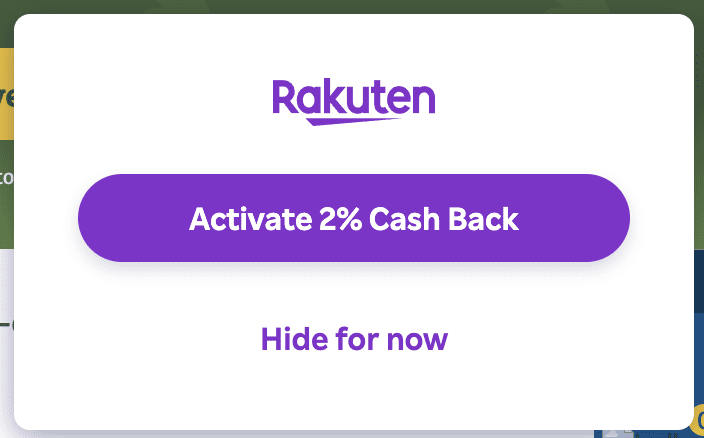
Pro tip: Forget to click “Activate Cash Back”? That’s like ordering a Mickey-shaped beignet and forgetting the powdered sugar. Always double-check the extension!
- Annual Passholder Perks = Freebie Goldmines
- SeaWorld hooks passholders with free friend tickets during slow seasons and quarterly (read: when the penguins outnumber the people).
- Six Flags and others run “Bring-a-Friend” deals—perfect for your thrill-seeking squad.
- Bold move: Befriend an annual passholder (not solely for this purpose of course). They’re the theme park equivalent of a Costco membership card.
- Credit Card Rewards: Swipe Smarter
- Use cash-back cards for purchases, then redeem points for gift cards (e.g., Disney Gift Cards at Target with a RedCard for 5% off).
TL;DR: Activate Rakuten, buddy up with passholders, and treat your credit card like a park ticket genie.
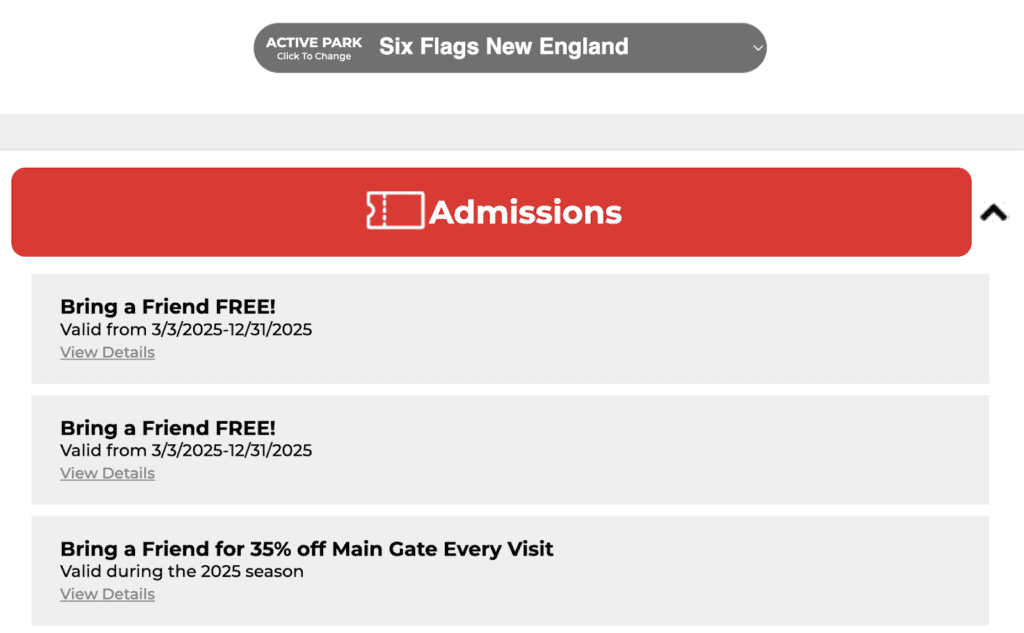
Bundle and Save: Discounted Vacation Packages
Vacation packages are like the combo meal of theme park planning: hotels, tickets, and sometimes food, all wrapped in a delicious discount bow.
Why Bundle?
- Destination parks (Disney, Universal): Their packages often include “free” dining plans or Early Park Entry—worth their weight in churros. As a matter of fact at Universal if you book at one of their Signature hotels during your stay you receive a Universal Express Pass for every person listed on the room which is totally worth it.
- Regional parks (Dollywood, Hersheypark): Smaller parks might include lodging + tickets, saving you the hassle of piecing it together.
How to Hack It:
- Book Early: Hersheypark’s “Stay & Play” deals drop 3-6 months out.
- Compare Third Parties: Costco Travel and Undercover Tourist bundle hotels + tickets cheaper than parks’ own sites.
- Food Add-Ons: If you’re a snackaholic, Disney’s dining plan or Knott’s Berry Farm’s Boysenberry Festival Hotel package might save cash—but crunch the numbers first.
Watch Out For:
- Hidden resort fees (the spinach-in-your-teeth of vacation planning).
- “Free” perks that require a park ticket purchase.
Bottom Line: Bundles = less stress + more savings. Just read the fine print like it’s a rollercoaster height requirement.
Take Advantage of Membership Discounts
Your memberships are like buried treasure—dig a little, and you’ll strike theme park gold.
- Warehouse Clubs (Costco, Sam’s Club, BJ’s)
- Sam’s Club slashes prices on Disneyland tickets. Costco Travel bundles Universal packages.
- Pro move: Buy discounted gift cards here to pay for tickets, food, and merch.
- AAA (CAA)/AARP: Not Just for Road Trips
- AAA (CAA): Save up to 20% on Disney/Universal tickets and bigger savings (think up to 50%) at parks such as Legoland and SeaWorld. Some of these tickets also come with Dining Dollar certificates, meal vouchers, or free child tickets.
- AARP: Despite this being known as the “old people card” there’s actually no age limit! Anyone can join for $20/year and snag ticket discounts on SeaWorld, Legoland, and more.
- ID.me: Discounts or Cash Back for Heroes
- Verify your status (military, teacher, nurse, etc.) for deals like:
- Universal: 2.0% cash back for nurses.
- SeaWorld: $99.99 SeaWorld San Diego 2025 Military Pass
- Student hack: Check your university’s “Student Life” page—some partner with parks for exclusive rates.
- Verify your status (military, teacher, nurse, etc.) for deals like:
The Sneaky Bonus:
- Stack discounts where possible! By utilizing the power of the internet make sure you’ve got your Rakuten extension installed to see if you’re able to stack discounts wherever possible. Memberships restrict the travel category from Rakuten, so unfortunately you won’t be able to stack there, but maybe AAA/AARP or ID.me may come in handy.
Buy Multi-Day or Annual Passes to Maximize Value
Buying a one-day ticket at the gate is like paying $20 for a single chicken tender—you’re getting scammed, and even Warren Buffett would side-eye you.
Here’s why multi-day or annual passes are your golden ticket:
- Math Doesn’t Lie:
- Let’s use Dollywood first (#1 best theme park in the US, by the way!):
- 1-day: $92 (that’s $92 per day)
- 2-day: $122 ($61/day)
- 3-day: $132 ($44/day—practically paying in loose change here guys!)
- Disney World: A 5-day ticket costs less per day than a 1-day pass. Remember dynamic pricing though! Either way, more savings, cha-ching!
- Let’s use Dollywood first (#1 best theme park in the US, by the way!):
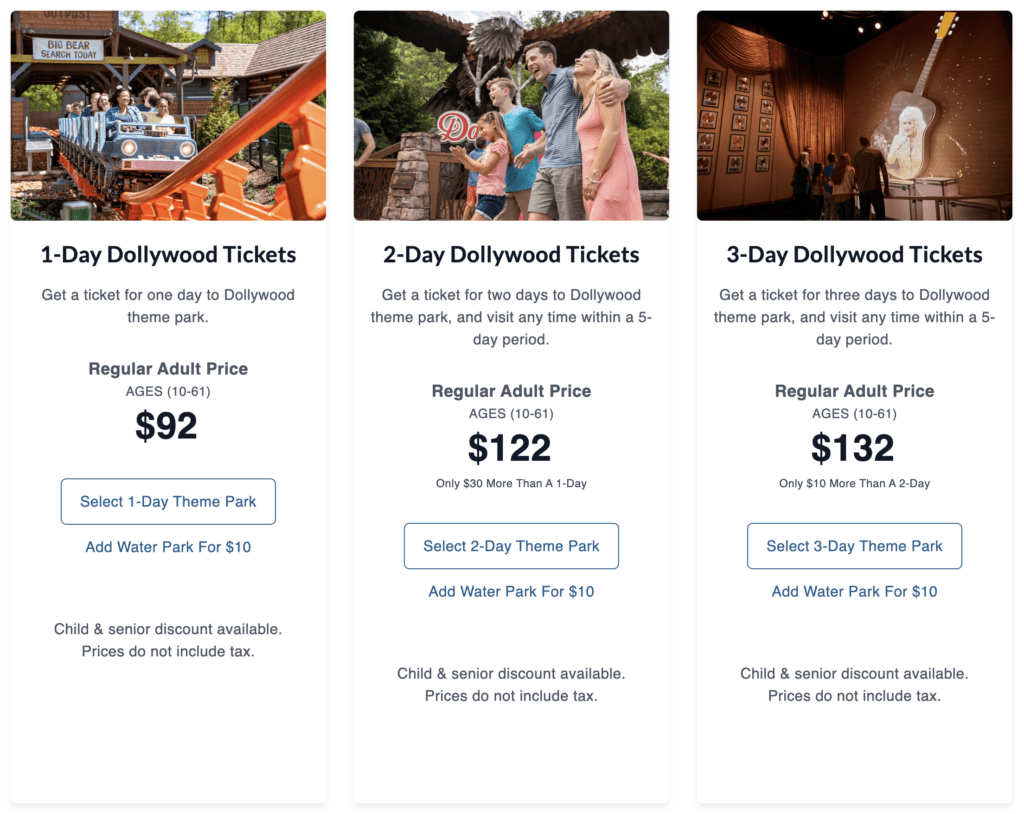
- Annual Passes = VIP Status:
- Six Flags: Their Gold and Prestige passes (with the All Park Passport add-on) grant access to all 27 parks nationwide. Visit just two parks in a year, and you’ve already saved money.
- SeaWorld (Busch Gardens, Sesame Place, etc.): Passholders get free parking, merch discounts, and early access to new rides.
- Hot tip: Check for “monthly payment” options. Disney’s Incredi-Pass splits costs into bite-sized chunks for Florida residents—no ramen-noodle budget required.
When to Splurge on an Annual Pass:
- You live within 3 hours of the park (weekend trips = easy).
- You’re planning at least two visits in a year (most passes pay for themselves by visit #2).
- You crave discounts on food/merch and even free parking if offered (Disney’s passholders save 10-20% on snacks—worth it for the Mickey-shaped pretzels alone).
Pro Tip:
Calculate the “Cost Per Ride” to justify whatever pass you’re looking into. For example:
- Universal’s 2 Park Premier Pass: $963.82 (I included tax) ÷ 20 visits = $48.19/day vs $119/day (on the low end). Add free parking ($32/day) and free Express Pass once per ride after 4 PM? You’re basically printing money. 🥳
The only things to look out for are the fine print–blackout dates and the non-transferability of your annual passes. Some passes block peak days (July 4th, Thanksgiving, Christmas, New Years), so check the calendar before choosing the pass you want, and sharing isn’t caring here–passes are tied to your fingerprint/face recognition as parks upgrade their systems.
The bottom line is the more days you buy (or in the event of buying a pass), you’ll have extra cash for all the Cinnamon Bread at Dollywood.
Look for Special Promotions or Limited-Time Deals
Theme parks love to run special promotions, but you need to know where (and when) to find them. Seasonal discounts, flash sales, and special events can all lead to serious savings.
Where to Find the Best Deals
- Annual Sales Events: Keep an eye out for deals during Black Friday, Cyber Monday, and Travel Tuesday (Tuesday after Thanksgiving). Parks like SeaWorld and Busch Gardens often slash prices by up to 50% on these days.
- Park Websites Before Season Opening: As seen below for HersheyPark, they ran a ticket deal that was on their site last seen on March 31, 2025. Their season opens(-ed) on April 5th.
- Social Media & Newsletters: Parks sometimes release exclusive promo codes or let pass holders know about extra tickets on their account through their social media channels or email lists. Following their accounts and signing up for their newsletters ensures you’re among the first to know.
- Bundle Deals: Websites like Trip.com and Undercover Tourist occasionally offer bundled discounts that include parking, dining, or multi-park access at a reduced rate.
- Local Resident Discounts: Many parks offer lower ticket prices for residents of the state or surrounding areas. Check the park’s official website or look for special partnerships through organizations like AAA or Costco.
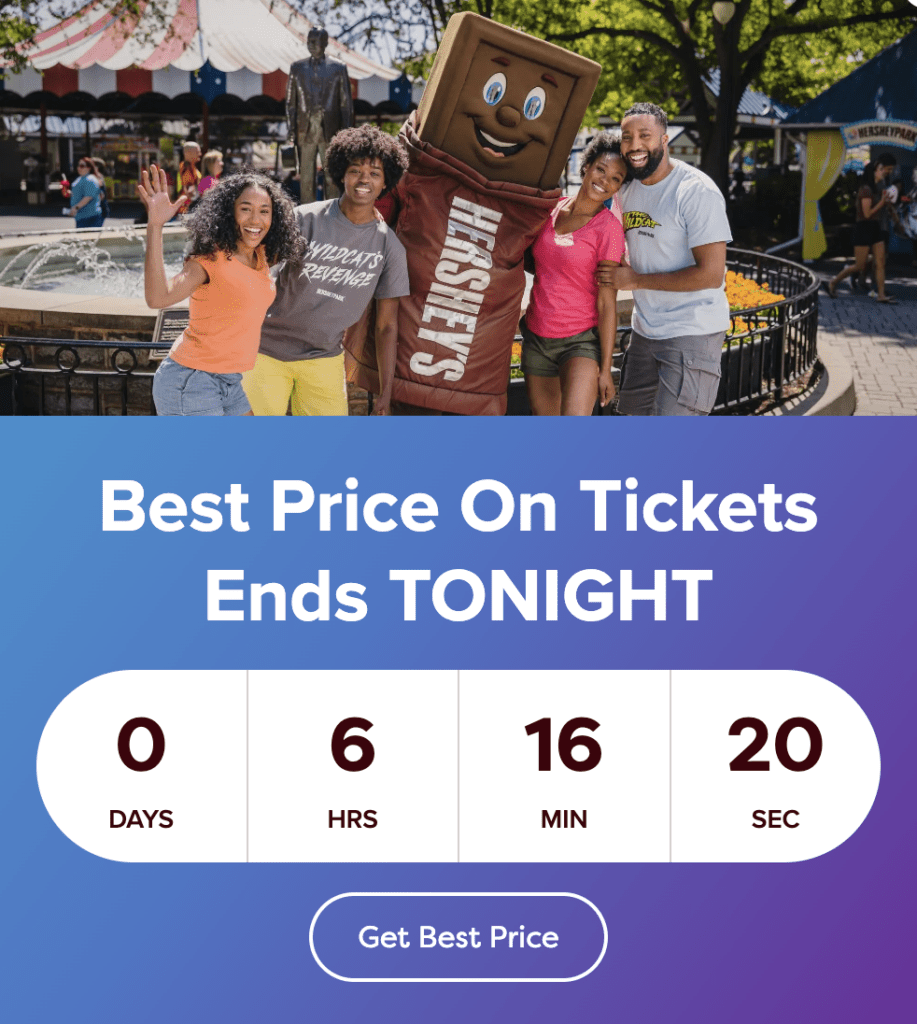
Consider Visiting During Off-Peak Seasons
Visiting theme parks during off-peak seasons isn’t just a money-saver—it transforms your entire experience. Here’s a detailed breakdown of why timing matters and how to maximize your trip:
The main reason for visiting during off-peak is for the lower ticket prices and accommodations. In August you might spend $119 on a ticket at Disney but in March $154 when it’s Spring Break, which will reflect in the accommodation prices as well (hotel, AirBnb, campgrounds, etc) increasing your overall costs and ballooning your budget. However, there are some other non-ticket/accommodation perks during the off-peak season, too.
1. Shorter Wait Times Mean More Rides
Peak seasons (summer, holidays) often see wait times of 2+ hours for popular rides like Seven Dwarfs Mine Train at Disney World or Hagrid’s Magical Creatures Motorbike Adventure at Universal Orlando. Off-peak periods (January–February, September–November) will often see waits at half of those times (but not guaranteed).
- Example: At Universal Orlando, average wait times drop by 60% on weekdays in September compared to July.
- Tip: Use the My Disney Experience or Universal apps to monitor real-time wait times and plan your day efficiently.
2. Easier Access to Dining and Experiences
High-demand reservations like Pat O’Brien’s (Universal Orlando) or Bibbidi Bobbidi Boutique (Walt Disney World) are notoriously hard to book during peak crowds. Off-peak visits increase your chances:
- Disney Dining: Reservations open 60 days in advance. During peak times, slots vanish within minutes (sometimes seconds). Off-peak, you may find availability even weeks later.
- Strategy: Set alerts on apps like MouseDining for last-minute cancellations.
3. Comfortable Weather Enhances Your Day
Summer heat in Orlando (average 90°F+) can drain energy and require frequent breaks. Off-peak months like January (average 70°F) offer cooler, manageable weather:
- Hydration: Less urgent, saving money on bottled water.
- Attire: Light jackets suffice, avoiding sweat-soaked shirts.
- Regional Parks: Six Flags Magic Mountain in California sees milder temps in spring/fall, making outdoor queues tolerable.
4. Fewer Families and School Groups
Off-peak weekdays (especially outside school breaks) mean:
- Regional Parks: Six Flags/Cedar Fair parks see fewer teens and school groups, creating a calmer atmosphere.
- Destination Parks: Disney and Universal attract more international tourists year-round, but weekdays in September or January are quieter.
- Adult-Centric Perks: Enjoy bars or festivals (EPCOT’s Food & Wine) without competing with strollers.
Despite all those positives, there are some trade-offs to consider–
- Reduced Hours: Parks may close earlier (e.g., Disney’s Magic Kingdom at 6 PM vs. 11 PM in summer). Check schedules in advance.
- Closed Attractions: Water rides (Disney’s Kali River Rapids) or seasonal shows (Universal’s Grinchmas) may be unavailable.
- Weather Risks: January visits to northern parks (Cedar Point, Lake Compounce) are a no-go, but even parks in warmer climates run the risk of hurricanes or fire depending on their high-risk season.
And you should probably know how to identify off-peak dates, right? Well, I’ve gotchu!
- Crowd Calendars: Use Touring Plans or The Orlando Informer (best for Universal) for data-driven predictions.
- School Schedules: Avoid weeks around Thanksgiving, Spring Break, and summer holidays, especially if you’re not a fan of too many kids.
- Park Events: Steer clear of marathons, festivals, or new park openings (e.g., Universal Orlando’s Epic Universe).
Pro Tip: Pair off-peak visits with discounted hotel rates for maximum savings.
Basically off-peak travel balances cost, comfort, and crowd control. By avoiding peak dates, you’ll spend less time waiting and more time enjoying your time wherever you are—whether that’s riding Guardians of the Galaxy three times in a row or savoring a leisurely meal at Pat O’Brien’s.
Save on Parking, Food, and Extras
Tickets are just the start—once you’re inside, extra costs add up fast. Here’s how to keep more cash in your wallet.
Parking Hacks
- Use Hotel Shuttles: If you’re staying at a partner hotel, take advantage of free shuttles instead of paying $25-$50 every day for parking. If you’re on property and they offer free parking with your stay and you don’t need your car, still use the shuttles if you’re OK with the hustle and bustle of waiting for the buses at the end of the day (saving the planet one car at a time!).
- Annual Passholder Perks: Some season pass tiers include free or discounted parking, saving you money in the long run (I promise you! Universal Orlando’s parking is at $32 PER DAY FOR REGULAR PARKING 😭).
- Rideshare vs. Driving: If you’re close enough, using Uber or Lyft might be cheaper than parking fees, especially for short visits.
Food & Drink Savings
- Bring Your Own Snacks/Meals: Some parks allow small snacks and water bottles (even complete meals in appropriate storage—check their policies to avoid overpriced park food.
- Dining Plans: If you’re spending a full day, all-day dining plans can be worth it. Parks like Six Flags and Disney offer day meal options either at a flat rate or bundled with your hotel stay.
- Refillable Souvenir Cups: Parks often have refillable drink programs where you pay once and get unlimited refills for the day or season.
Merchandise & Extras
- Buy Souvenirs Outside the Park: Amazon and local stores often carry the same branded merch at a fraction of the cost. And if they don’t, think to yourself—do I really want to carry this around with me all day?
- Use Reward Programs: Credit cards with cashback on travel or dining can help offset expenses, and some memberships (e.g., AAA) may offer discounts on in-park shopping.
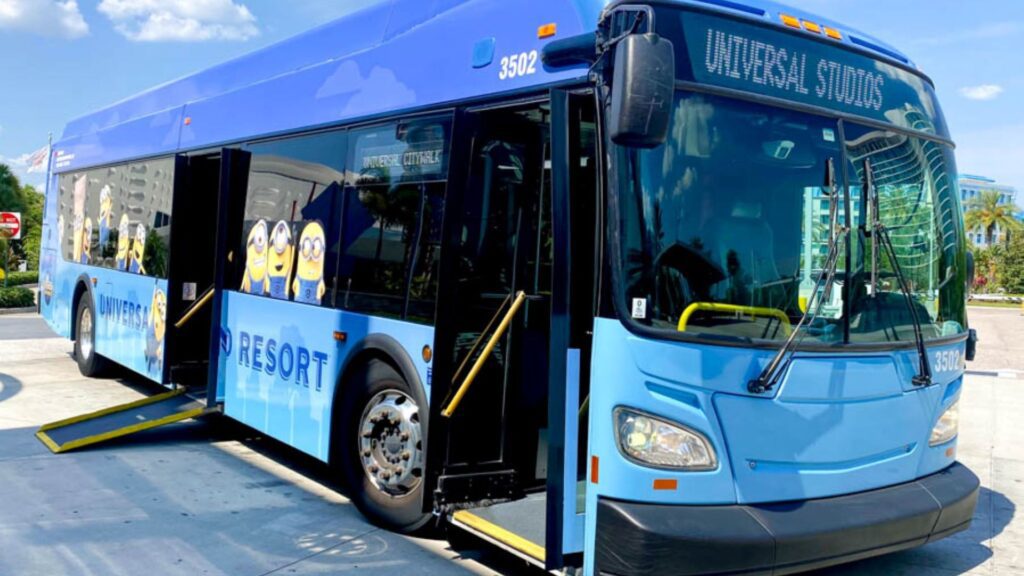
Frequently Asked Questions (FAQs)
Are third-party ticket sellers legitimate?
Yes, some are, however stick to authorized resellers like Undercover Tourist, Trip.com, or Costco Travel. Avoid scalpers or unknown sites with deals that seem too good to be true.
Can I bring my own food into the park?
Most parks allow small snacks and bottled water, but policies vary. Check the park’s official website to confirm.
P.S. We have a blog post on theme park policies that we update every once in a while if you don’t want to go looking for them on your own.
Do theme park ticket prices ever drop last-minute?
Rarely; the likelihood is no. More parks are operating on dynamic pricing, which means prices fluctuate depending on seasonality and holidays. Buying early is usually the best bet, especially if you’re going to a destination park such as Universal or Disney.
What’s the best way to get a discount on Disney and Universal tickets?
Buy multi-day tickets, check for resident discounts, or purchase through an authorized reseller like Undercover Tourist or The Orlando Informer (Universal Orlando).
Is an annual pass worth it?
It truly depends on the park! You’ll need to price out the pass for certain operators. For mid-tier operators like Six Flags, their annual passes pay for itself in two to three visits, whereas, a Disney pass pays for itself between 8-13 visits due to dynamic pricing if you’re not a CA or FL resident and are on their highest tier. Annual/seasonal passes often pays for itself with perks like free parking, discounts on food and merch, and even special event access as well, so don’t forget to factor those in, too.
Let’s Save Money on Theme Park Tickets!
Saving money at theme parks doesn’t mean sacrificing fun! There are other ways to save and I’m sure that when I find out about them, I’ll let you in on them as soon as I figure them out, don’t you worry. 😉 Sit tight, but enjoy this list for now.
With the right planning and insider tricks, you can enjoy every moment while keeping your budget in check. Keep these tips in mind, and your next theme park adventure will be just as thrilling—without the financial roller coaster. 🎢💰
Let me know in the comments: What’s your favorite money-saving tip for theme parks?
And if you haven’t as of yet, please follow me on my other social media channels (YouTube, Instagram, & TikTok – @themeparkbites) once I’m movin’ and groovin’. Thank you for allowing me to be your tasty theme park companion!
